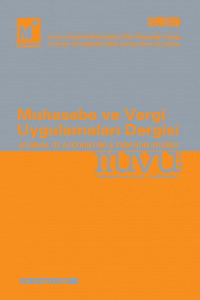ZAMAN ESASLI FAALİYETE DAYALI MALİYETLEME VE KAYNAK TÜKETİM MUHASEBESİ MALİYET YÖNTEMLERİNİN KARŞILAŞTIRILMASI
Günümüz rekabet ortamında doğru fiyatlandırma çalışmaları yapılabilmesi için doğru, güvenilir, zamanında maliyet bilgisi önem taşımaktadır. Bu nedenle birçok maliyet hesaplama yöntemi geliştirilmiştir. Bu yöntemlerden yeni nesil iki yöntem Zaman Esaslı Faaliyete Dayalı Maliyetleme (ZEFDM) ve Kaynak Tüketim Muhasebesi (KTM)’dir. Bu çalışmada, anılan iki maliyet yöntemi karşılaştırılmış ve varsayımsal bir örnek ile maliyetlerin ürünlere dağıtımı yapılarak, her iki yöntemin ortak ve farklı yönleri ortaya konulmaya çalışılmıştır. Her iki yöntemin de çıkış noktasını faaliyete dayalı maliyetleme (FDM) oluşturmaktadır. Maliyet dağıtımlarında, ZEFDM, zamanı temel maliyet etkeni olarak ele almakta iken, KTM aynağa göre birden çok maliyet etkenini dikkate almaktadır. Varsayımsal örnek çerçevesinde, KTM yönteminin maliyet dağıtımında daha hassas olduğu dolayısıyla maliyet hesaplamaların da yöneticilere karar almalarında daha faydalı bilgiler sağladığı tespit edilmiştir.
Anahtar Kelimeler:
Zaman Esaslı Faaliyete Dayalı Maliyetleme, Kaynak Tüketim Muhasebesi, Faaliyete Dayalı Maliyetleme, Maliyet Yönetimi
COMPARISON OF THE TIME DRIVEN ACTIVITY BASED COSTING AND RESOURCE CONSUMPTION ACCOUNTING COST METHODS
In todays’ competitive environment accurate, reliable and timely cost information is important for making true pricing. Therefore, many cost accounting methods were developed. Time Driven Activity Based Costing (TDABC) and Resource Consumption Accounting (RCA) are the new generation of these methods. These two cost methods were compared and costs were delivered to products by hypothetical sample, so it was tried to reveal common and different aspects of these methods in this study. Activity Based Costing (ABC) is the starting point of both of the methods. While TDABC considers time as a cost driver, RCA considers a lot of cost driver that changes according to the resource. Within the scope of hypothetical sample, it was determined that RCA is more precise in cost delivering so it provides more useful information to managers in their decisions about the cost accounting.
Keywords:
Time Driven Activity Based Costing, Resource Consumption Accounting, Activity Based Costing, Cost Management,
___
- Aktaş, R. (2013). Yeni Bir Maliyet ve Yönetim Muhasebesi Yöntemi Olarak Kaynak Tüketim Muhasebesi. Muhasebe ve Finansman Dergisi, 58, 55-75.
- Büyükmirza, H. K. (2014). Maliyet ve Yönetim Muhasebesi (19. Baskı), Ankara: Gazi Kitabevi.
- Civelek, M., Özkan, A. (2006). Maliyet ve Yönetim Muhasebesi, (4.Baskı), Ankara: Detay Yayıncılık.
- Everaert, P., Bruggeman, W. (2007). Time-Driven Activity-Based Costing: Exploring The Underlying Model. Cost Management, 21(2),16-20.
- Everaert, P., Cleuren G.& Hoozee, S. (2012). Using Time-Driven ABC to Identify Operational Improvements: A Case Study in a University Restaurant. Cost Management, 26(2), 41-48.
- Kaplan, R. S., Anderson, S. R. (2007) (a), Time-Driven Activity Based Costing, Boston:Harvard Business School Press.
- Kaplan, R. S., Anderson, S. R. (2007) (b). The Innovation of Time-Driven Activity- Based Costing. Cost Management, 21(2), 5-15.
- Koşan, L. (2007). Maliyet Hesaplamasında Yeni Bir Yaklaşım: Sürece Dayalı Faaliyet Tabanlı Maliyet Sistemi, Mali Çözüm, 84, 155-168.
- Köse, T. (2010). Sürece Dayalı Yönetim Kapsamında Maliyet Yönetimi, Ankara:Detay Yayıncılık.
- Köse, T., Ağdeniz, Ş. (2015). Kaynak Tüketim Muhasebesinde Kapasite Maliyet Yönetimi. Muhasebe ve Denetime Bakış Dergisi, 45, 51-74.
- McGowan, C. (2009). Time-Driven Activity-Based Costing. Accountancy Ireland, 41(6), 60-61.
- Mitchell, M. (2007). Leveraging Process Documentation for Time-Driven Activity Based Costing. Journal of Performance Management, 20(3), 16-28.
- Perkins, D., Stovall, O.S. (2011). Resource Consumption Accpunting- Where Dose It Fit?. Journal of Applied Business Research, 27(5), 41-51.
- Tanış, V.N., Özyapıcı, H. (2012). The Measurement and Management of Unusued Capacity in a Time Driven Activity Based Costing System. Journal of Applied Management Accounting Research, 19(2), 43-55.
- Tse, M.S.C., Gong, M.Z. (2009). Recognition of Idle Resources in Time-Driven Activity Based Costing and Resource Consumption Models. Journal of Applied Management Accounting Research, 7(2), 41-54.
- White, L. (2009). Resource Consumption Accounting:Manager-Focused Management Accounting. The Journal of Corporate Accounting and Finance, 63-77.
- Yılmaz, R., Gökhan, B. (2007). Kurumsal Performans Yönetimi’nde Sürece-Dayalı Faaliyet Tabanlı Maliyetleme. 5. Uluslararası Türk Dünyası Sosyal Bilimler Kongresi Bildiri Kitabı, Celalabat, Kırgızistan.
- Yükçü S.,Gönen S. (2009). Zaman Esaslı FDM Yaklaşımının Otomobil Parçaları Üreten Bir İşletmede Uygulanması. Muhasebe ve Denetime Bakış Dergisi, 28, 19-36.
- ISSN: 1308-3740
- Yayın Aralığı: Yılda 2 Sayı
- Başlangıç: 2008
- Yayıncı: Ankara Serbest Muhasebeci Mali Müşavirler Odası
